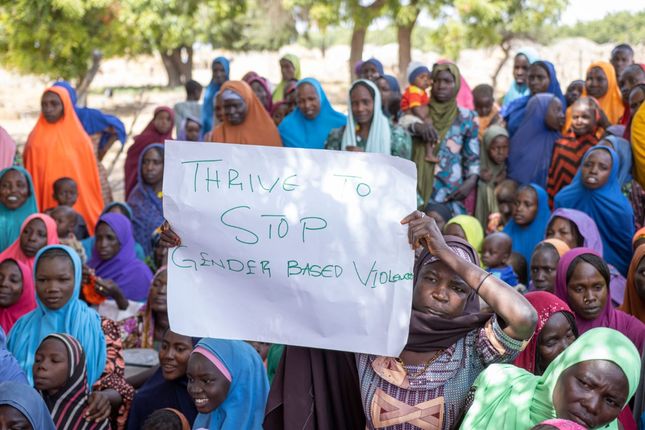
Safe water supply and protection against violence
The long-lasting humanitarian crisis in north-eastern Nigeria has now been going on for almost 15 years. Around 16 million people are permanently at risk from constant fighting, attacks, kidnappings and other acts of violence (as of 2023). Flight, displacement and considerable restrictions in daily life are the result. Our work in this area has been running since 2017 and focuses on conflict-affected communities in the north-eastern states of Borno (Maiduguri Metropolitan Region, Jere), Adamawa (Yola South, Girei, Lamurde, Guyuk, Shelleng and Numan). TThe focus is on the areas of water, sanitation and hygiene (WASH) and protection, particularly against gender-based violence.The aim is to strengthen the resilience of all people affected i.e. refugees, internally displaced persons and returnees, as well as residents in the host communities. The project is funded by the German Federal Ministry for Economic Cooperation and Development.
The lives of the people in the project's target communities are determined by the constant threat of armed conflict and the humanitarian crisis caused by the long-standing conflict. The humanitarian situation is further exacerbated by the large number of internally displaced persons, as 83 percent of internally displaced persons in Nigeria are in Borno State, plus refugees from Niger and Cameroon. In 2022, some camps were closed, putting further strain on the host communities.
As a result, around 5.1 million people in the project areas do not have sustainable and equitable access to clean water and decent hygiene and sanitation services (OCHA, 2024). This means, for instance, that are not enough wells available to cover people's needs or that the distances to the wells are not appropriate.
Women and girls are discriminated against due to the ongoing crisis. For example, they have less access to education and economic activities. In addition, they are often exposed to gender-based violence in various forms, and not least through the use of unsafe, distant wells and sanitation facilities.
We want to increase the resilience of the population and strengthen social cohesion.
Protection from gender-based violence:
- Reducing the risk of gender-based violence
- Qualitative improvement of prevention and aftercare services
- Strengthening the economic self-determination of women
Water, sanitation and hygiene:
- Safe, inclusive and sustainable access to adequate water and sanitation services
- Protection against diseases caused by inadequate personal and community hygiene
- Strengthening local institutions from the state and civil sector through training and information so that the humanitarian measures implemented can be monitored, managed and maintained by local capacities in the future.
Protection from gender-specific violence:
- Training of volunteers and further training of professionals in case management and prevention
- Refurbishment or construction of eight shelters run by our partner, the National Council on Women's Societies
- Providing information on protection services, reporting and community-based prevention measures through awareness-raising campaigns and household visits by volunteers from our partner organization
- Supporting job promotion measures for women
- Providing starter kits and start-up funding for women to promote income generation and reduce dependency
Water, sanitation and hygiene:
- Supporting the state agency for rural water and sanitation in the construction and rehabilitation of 30 solar or electrically powered water systems
- Establishment of WASH committees whose members are trained in the operation and maintenance of water systems
- Provision of tools and repair materials for the water systems
- Recording the water systems in the online directory mWater, which collects information on overuse and climatic fluctuations, contributing to better management of water resources
- Carrying out a needs assessment for sanitation facilities with the involvement of the communities
- Construction or renovation of 30 gender-segregated sanitary facilities adapted to the needs of people with disabilities at public schools and health facilities
- Support the establishment and promotion of two women-owned businesses for the local production of reusable sanitary towels; the beneficiaries are selected together with the communities.
- Provision of materials for the production of sanitary towels
- Offers for training courses on production, trade and marketing
- Offers for educational training on the topic of menstrual hygiene
Country info
Capital: Abuja
Area: 923.770 km²
Population: approx. 218 Mio.
Project data
Financing: German Federal Ministry for Economic Cooperation and Development
Partners: RUWASSA (Rural Water Supply and Sanitation Agency), NCWS (National Council for Women's Societies)








